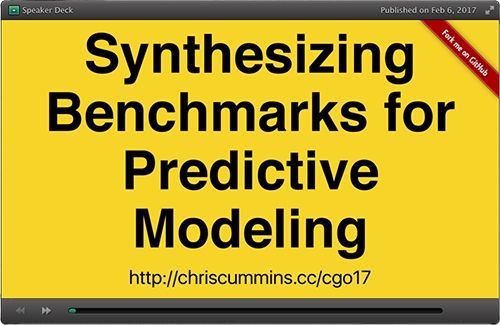
Maintainer: fivosts. See BenchPress for a more recent version. BenchPress also supports CLgen models.
CLgen is an open source application for generating runnable programs using deep learning. CLgen learns to program using neural networks which model the semantics and usage from large volumes of program fragments, generating many-core OpenCL programs that are representative of, but distinct from, the programs it learns from.
First check out INSTALL.md for instructions on getting the build environment set up .
Then build CLgen using:
$ bazel build -c opt //deeplearning/clgenUse our tiny example dataset to train and sample your first CLgen model:
$ bazel-bin/deeplearning/clgen -- \
--config $PWD/deeplearning/clgen/tests/data/tiny/config.pbtxtCLgen is a tool for generating source code. How you use it will depend entirely on what you want to do with the generated code. As a first port of call I'd recommend checking out how CLgen is configured. CLgen is configured through a handful of protocol buffers defined in //deeplearning/clgen/proto. The clgen.Instance message type combines a clgen.Model and clgen.Sampler which define the way in which models are trained, and how new programs are generated, respectively. You will probably want to assemble a large corpus of source code to train a new model on - I have tools which may help with that. You may also want a means to execute arbitrary generated code - as it happens I have tools for that too. :-) Thought of a new use case? I'd love to hear about it!
Presentation slides:

Publication "Synthesizing Benchmarks for Predictive Modeling" (CGO'17).
Jupyter notebook containing experimental evaluation of an early version of CLgen.
My documentation sucks. Don't be afraid to get stuck in and start reading the code!
Copyright 2016-2020 Chris Cummins chrisc.101@gmail.com.
Released under the terms of the GPLv3 license. See LICENSE for details.


